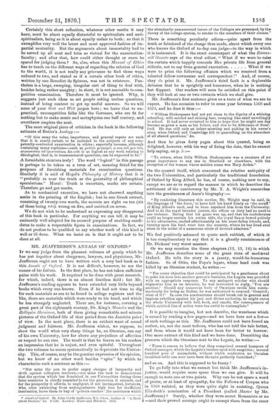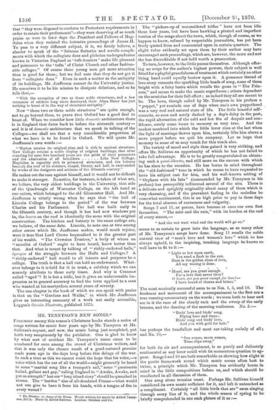MR. JEAFFRESON'S ANNALS OF OXFORD.*
IF we may judge from the pleasant volumes of gossip which he has put together about clergymen, lawyers, and physicians, Mr.
Jeaffreson ought not to have written such a very bad book as is this Annals of Oxford. It is not difficult, however, to see the
causes of his failure. In the first place, he has not taken sufficient pains with his work. It required to be done with great research, for which, indeed, there is an almost limitless field ; but Mr.
Jeaffreson's reading appears to have extended very little beyond books which every one knows. Even if he had not time to dig for such materials as are to be found in college registers and the like, there are materials which were ready to his hand, and which he has strangely neglected. There are, for instance, covering a
great part of the eighteenth century, Dr. King's Memoirs and the Relliquiie Hernianm, both of them giving remarkable and minute pictures of the Oxford life of that period from the Jacobite point
of view. In the next place, there is an evident want of sound judgment and fairness. Mr. Jeaffreson wishes, we suppose, to show the world what very sharp things he, an Oxonian, can say of is own University, how far above any prejudices of affection or respect he can rise. The result is that he leaves on his readers an impression that he is unjust, and even spiteful. Throughout the two volumes he seems systematically to depreciate the Univer- sity. This, of course, may be the genuine expression of his opinion, but we know of no other word besides "spite" by which to characterize such a sentence as this :—
"Not mine the pen to prefer angry charges of incapacity and sloth against collegiate teachers,—not mine the task to demonstrate that the system which has flourished in our Universities during these later centuries is chiefly remarkable for the protection it extends, and for the prosperity it affords, to negligent, if not incompetent, lecturers, who, after extracting from undergraduates high foes for inefficient instruction, leave them to buy of'private coaches' the assistance which • Annals of Oxford. By John. Cordy Jeaffreson. B.A. Oxon., Author of "A Book about Doctors," &c. 2 vole. London: Hurst and Blackett. 1871. the abundantly-remunerated tutors of the Colleges are presumed, by the theory of the college system, to render to the members of their classes."
There is something peculiarly odious—quite apart from the truth or falsehood of the charge thus made, about which every one
who knows the Oxford of to-day can judge—in the way in which it is insinuated. It is the exact counterpart of what the Eatans- will Gazette says of the rival editor, "What if we were to raise the curtain which happily conceals His private life from general
ridicule, not to say from general execration What if we were to print the following effusion which we received from a
talented fellow-townsman and correspondent !" And, of course, they do print it. Mr. Jeaffreson's third fault is a deplorable
delusion that he is sprightly and humorous, when he is nothing but flippant. Our readers will soon be satisfied on this point if they will look at one or two extracts which we shall give.
Mr. Jeaffreson's first sentence gives us a taste of what we are to expect. He has occasion to refer to some year between 1560 and 1570, and he does it thus :—
" William Shakespeare had not yet risen to the dignity of a whining schoolboy, with satchel and shining face, creeping like snail unwillingly to school. It had never occurred to him to hope that he might one day become as great a man as his father, and rise to be Alderman of Strat- ford. He was still only an infant mewling and puking in his nurse's arms, when Oxford and Cambridge fell to quarrelling on the absurdest of all absurd questions," d:o.
And then he gives forty pages about this quarrel, being so delighted, however, with his way of fixing the date, that he cannot help saying, on p. 5 :—
" To return, when little William Shakespeare was a creature of no great importance to any one in Stratford or elsewhere, with the exception of the woman whose maiden name was Mary Arden."
On the quarrel itself, which concerned the relative antiquity of the two Universities, and particularly the traditional foundation of Oxford by King Alfred, he has, of course, nothing new to say, except we are so to regard the manner in which he describes the settlement of the controversy by Mr. T. A. Wright's researches into the genuineness of Asser's biography:—
" By rendering literature this service, Mr. Wright may be said, in the language of the force,' to have laid his hand firmly on 'the scruff' of King Alfred's neck, and to have repulsed him from the University. And to do the royal intruder justice, the officer on duty had no need to use violence. Seeing that his game was up, and that his confederates could no longer sustain his rotten title, the royal Saxon bowed politely to his adversaries, smiled affectionately on his crest-fallen friends, and, turning upon his heel, went into the country, where he has lived ever since in the midst of a numerous circle of devoted admirers."
We feel positively ashamed to quote such rubbish, of which it is too complimentary to say that it is a ghastly reminiscence of Mr. Dickens' very worst manner.
Or we may mention the three chapters (12, 13, 14) in which Mr. Jeaffreson describes some of the great riots of mediaeval Oxford. He tells the story in a jaunty, would-be-humorous fashion. So of Otho, the Pope's legate, whose head cook was killed by an Oxonian student, he writes :—
"For every objection that could be anticipated by a gentleman about to poke his nose into another person's business, the Legate was provided with an appropriate response. To any malapert scholar who should stigmatize him as an intruder, he was instructed to reply, 'You are another.' Should any numerous body of Oxonians revile him contu- maciously for being an Italian, he was authorized to respond, 'Granted; what of it ?' In case the academicians should break out in general and impious rebellion against his just and divine authority, he might curse the whole University with bell, book, and candle, the consequences of which spirited line of action were too awful to contemplate."
It is possible to imagine, but not describe, the weariness which is caused by reading a few pages—and we have here not a few—
of such verbiage as this. Mr. Jeaffreson could not have found an author, no, not the most tedious, who has not told the tale better, and from whom it would not have been far better to borrow. One more extract of this kind and we have done. Describing the presents which the Oxonians sent to the Legate, he writes :—
" There is reason to believe that they comprised several hampers of Oxford sausages, which the Legate's brother eyed with suspicion ; several hundred pots of marmalade, without which confection no Oxonian breakfast-table can ever have been thought perfectly furnished ;"
and so on. And this is supposed to be funny !
To go fully into what we cannot but think Mr. Jeaffreson's in- justice, would require more space than we can give. It will be enough to note one or two points. Why can he not spare a word of praise, or at least of sympathy, for the Fellows of Corpus who in 1568 resisted, as they were quite right in resisting, Queen Elizibeth's nomination of a President (called Master by Mr. Jeaffreson) ? Surely, whether they were secret Romanists or no —and their proved courage ought to exempt them from the sneer that "they were disposed to conform to Protestant requirements in order to retain their preferments"—they were deserving of as much praise as were in later days the President and Fellows of Mag- dalen when they resisted the intrusive proceedings of James II. To pass to a very different subject, it is, we firmly believe, a slander to speak of the "fulsome flatteries and servile compli- ments with which the collegiate dons and plebeian undergraduates known in Victorian England as tuft-hunters ' make life pleasant and poisonous to the ' tufts ' of Christ Church and other fashion- able colleges." Of course these young men get more attention than is good for them ; but we feel sure that they do not get it from "collegiate dons." Even in such a matter as the antiquity of its buildings, Mr. Jeaffreson cannot do the University justice. He conceives it to be his mission to dissipate delusions, and so he tells that,— " With the exception of two or three noble structures, and a few remnants of edifices long since destroyed, their Alma Mater has just nothing to boast of in the way of structural antiquity."
Now "these two or three noble structures" are quite enough, not to go beyond them, to prove that Oxford has a good deal to boast of. When we consider how little domestic architecture there is in England that dates back to before the sixteenth century— and it is of domestic architecture that we speak in talking of the Colleges—we shall see that a very considerable proportion of
what we have is to be found in Oxford. We will quote Mr. Jeaffreson's own words :—
" Merton retains its original plan, and is rich in ancient structure. New College retains a noble display of original buildings, that after standing for near five hundred years are the pride of their possessors
and the admiration of all beholders Like New College, Magdalen is superbly rich in primanal structure, and the loiterer beneath the roof of its cloisters, chapel, library, and hall, is surrounded by works of the designers and artizans of the fifteenth century."
He makes out the case against himself, and it would not be difficult to make it stronger. No notice, for instance, is taken of what are, we believe, the very oldest buildings in the University, that side of the Quadrangle of Worcester College, on the left hand as one enters, which belonged to the old Gloucester Hall. And Mr. Jeaffreson is utterly wrong when he says that "the hall of Lincoln College belongs to the period" of the war between
Charles and his Parliament. The hall was built early in the fifteenth century, and though it has had new windows put in, the louvre on the roof is identically the same with the original construction. The kitchen and buttery in the same college are, we believe, of the same date. Lincoln, to note one or two among other errors which Mr. Jeaffreson makes, would much rejoice, were it true that Lord Crewe bequeathed to it the greater part of his wealth. "The Creweian Trustees," a body of whom an "annalist of Oxford" ought to have heard, know better than that. And what is meant by talking of "richly-endowed halls," apropos of the struggle between the Halls and Colleges? A "richly-endowed" ball would to all intents and purposes be a college. The truth is that a hall can hold no endowment. What- ever belongs to it is held for it in trust, a subtlety which we can scarcely attribute to those early times. And why is Cranmer called " aged "? It is but a trifle, but it gives an unfavourable im- pression as to general accuracy to find the term applied to a man who wanted at his martyrdom several years of seventy.
The one chapter in the book of which we can speak with praise is that on the "Gardens and Walks," in which Mr. Jeaffreson gives an interesting summary of a work not easily accessible, Loggan's Oxonia Illustrata, published 1675.



































 Previous page
Previous page